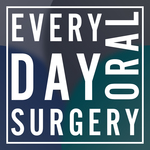Show notes:
As surgeons, we must ensure the highest and best use of our time, and an important part of this is creating systems and delegating unnecessary duties. Joining us today to share his insights on this is Dr. Thomas Sarna, an oral and maxillofacial surgeon, based in Fayetteville, Arkansas, and one of Grant’s mentors during residency. In this episode, Thomas walks us through some of his systems and the tasks he no longer does, including fielding calls, pre or post-op preparations and briefings, and calling around for referrals. Although creating structures and processes takes a lot of work and training on the frontend, once staff is up to par, surgeons have much more energy to do what they love, and ultimately create the most efficient practice possible. We also touch on communicating risks with clients and balancing being transparent with ensuring the patient remains comfortable and at ease. Thomas shares his approach and what he believes is the right amount to share. Along with this, we discuss the use of technology in Thomas’ practice and why he still prefers to take hand-written notes, how he handles communicating with difficult parents or patients, and the importance of knowing your staff’s strengths and weaknesses and drawing on them accordingly. It was a great conversation, and there is always so much to learn from one another's practices. To hear more, be sure to tune in today!
Key Points From This Episode:
- How creating systems to delegate duties has changed Thomas’ practice.
- The benefits of confirming patient appointments and improvement in efficiency.
- Why Thomas does not give his cell number to patients and leaves his assistants to field calls.
- Hear more about what Thomas’ schedule looks like and how COVID has affected it.
- The brief nature of Thomas’ consults and what he tells the patients.
- Walking patients through options if numbness is a concern when the root is in the same place as the nerve.
- Thomas’ approach to communicating risk with patients.
- Following the acute versus chronic rule when it comes to sinus perforation repair.
- Using the buccal fat pad method and training NTs how to do it.
- ‘Good’ patients versus ‘bad’ patients and how Thomas thinks about this.
- The story behind why Thomas calls his difficult procedures ‘The Grant Stucki Clinic.’
- Some of the best things Thomas learned in residency that he carried into practice.
- Knowing your staff’s strengths and weaknesses and placing them in the right position.
- Instances of difficult communication with parents and patients Thomas has had.
- Why Thomas prefers doing wisdom teeth over implants.
- The frustration that both Thomas and Grant feel at patients constantly being on their phones.
- The use of tech in Thomas’ practice, including a cloud-based EMR.
- Why Thomas still takes notes by hand which then gets digitized after.
- Hear why Thomas has sedated patients sitting up rather than lying down.
- Take your wisdom teeth out when you are a teenager!
- Communicating wisdom teeth removal post-op care instructions.
- Why not using antibiotics is ‘career suicide’ according to Thomas.
Links Mentioned in Today’s Episode:
How to Win Friends & Influence People
Keywords: Thomas Sarna, Private Practice

